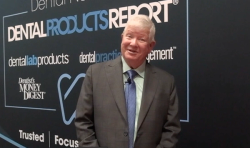- About Us
- Advertise
- Editorial
- Contact Us
- Terms and Conditions
- Privacy Policy
- Do Not Sell My Personal Information
© 2025 MJH Life Sciences™ and Dental Products Report. All rights reserved.
Lasers Can Transform Both the Patient Experience and the Practice
If done right, implementing a dental laser can dramatically change patient care, perception and a practice’s bottom line.
Being involved in dental lasers for more than 15 years and now being an independent coach/consultant, by far the most common question I get is, “Which laser should I buy?” My reply is always the same, “To answer that question, I first must ask you what you want to do with it?”
Not all lasers have the same abilities and each type has different pros and cons. I can tell you this, today’s lasers can be transformational for the patient and the dental practice’s bottom line while simultaneously making procedures easier and more conservative.
In order to do that, the purchasing doctor must do 2 things. First, know what you want to do with the laser. Second, be committed to learning how to optimize the technology.
In this article, I will give you a few short exercises to give you clarity to assist you moving forward with what is right for you.
Know What You Want to Do With the Laser
Every dental practice is different on its vision and culture and how it serves its patients. It is always good to reflect on your practice vision, put yourself in your patient’s shoes, and ask, “What experience do I want my patients to have when they are in my office?” Asking yourself this question will help you with some direction on the technology you should be looking to purchase.
Stop, take 5 minutes to do this exercise, and write down your reply to the above question.
Every dentist has certain aspects of dentistry they love and other aspects, well … not so much. Those aspects can be on both the clinical and business side of the practice. In addition, there are always things you want to start doing, or areas where you need to improve.
Take 5 minutes to reflect on this area in detail. The chart below can be used as a template for you:
I am a firm believer in focusing my energy on things I love to do, and delegating the things I do not like to do to the right team member or contractor. Many times, lasers can dramatically help you do many things better clinically. Learn the things with which a laser can help, get trained on the things you love, then have your associate or your itinerant specialist train on the other areas in which you are not as interested.
On the business side, you must think of yourself as a CEO and leader. As a business owner, you must set up the right culture and vision. Great leaders inspire and delegate. This all sounds simple and basic and it is the “secret sauce” for success. However, dental schools do not teach it and the “school of hard knocks” is not the most efficient way to learn. You would be surprised to learn that most CEOs have peer support masterminds. Most great athletes have great coaches. Don’t feel you have to do it alone. There are resources out there who have not only “been there, done that,” but can also give you pearls of wisdom to dramatically expedite and strengthen not only your clinical skills to optimize your laser, but help you as a dental CEO as well.
Be Committed to Learning How to Optimize the Technology
Dental laser technology is different than your traditional handpiece and scalpel. To put it simply, traditional dentistry is tactile and laser dentistry is non-contact.
No matter how you approach it, laser dentistry is different and you must be committed to going through a learning curve. So many times I see a dentist, for multiple reasons which many times is no fault of his or her own, have a negative first experience with a laser. I call this the “bumpy landing” hangover. Because the first case or two did not go well, many park the technology and vastly underutilize it. However, you simply cannot let this happen.
Remember, laser technology is not harder. It is just different, and you must commit to the change. This could mean going beyond what training you are offered with your equipment purchase. At a minimum, take all that is offered, but learn from others’ mistakes and do not make them. Get a laser coach to help you out after you have had the technology for a couple of months. You will know what you are good at and what you are struggling with and can get help with those areas. In addition, have a laser mentor to call. This could be your initial trainer or someone else. You will need someone to converse with before/after a tough case/situation to walk you through it, remove the future hurdles, and give you piece of mind. They have been there and can definitely help you in those unsure moments to get you through the other side unscathed with your confidence intact.
And last but certainly not least, do not forget about your team. The same rules apply to them. Are the patients getting the same and consistent educating/communication/pre-framing your laser and what it can do for them? Are they getting patients to enroll care, specifically same-day dentistry? Are they marketing the laser properly doubling your monthly new patients? Coaching is not limited to the doctor.
Conclusion
Lasers can transform both the patient experience and the practice, dramatically, if done right. Know what you want the laser to do for your practice by asking, “What experience do I want my patients to have when they are in my office?” This will guide you to which laser technology you will need, then be committed to learning how to optimize your laser and what training/coaching is available. Have a reality check going in and know you will have a couple of “bumpy landings” along the way. The key is to learn from them and know the next landing will not be as bumpy, and the one after that will even be better. Before you know it, the bumps will be few and far between.
Going through the school of “hard knocks” is frustrating and makes the journey challenging. Get a coach/trainer to help up front and early into the journey to expedite the integration and optimization for you as a clinician and CEO, as well as to benefit the team. You will be happy you did. You can transform your patient’s perception of dentistry and change the narrative with your accountant that you plan to use the additional laser revenue generated to focus on the next technology to better serve your patients.



